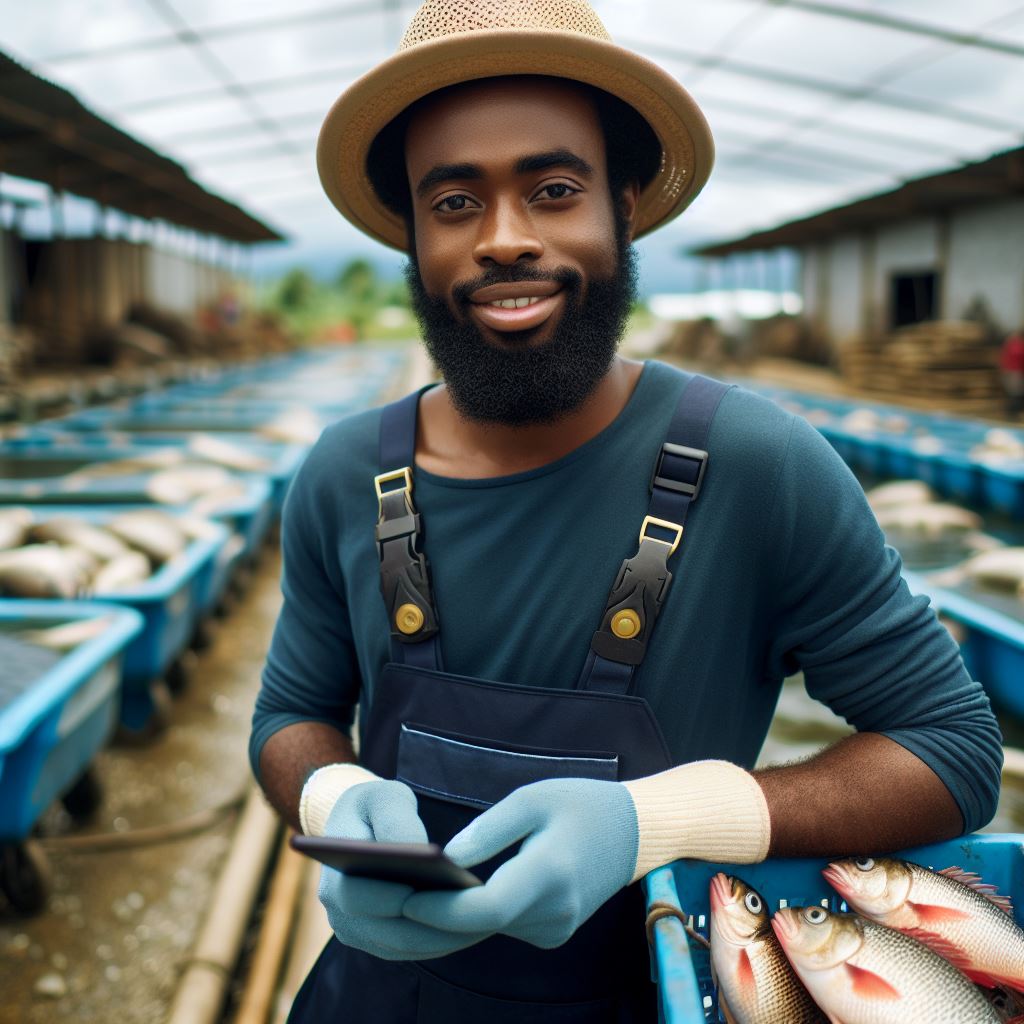Introduction
Nigerian aquaculture education is the process of teaching and learning about the cultivation of aquatic organisms in Nigeria.
It encompasses various aspects such as fisheries management, hatchery practices, and aquaponics techniques.
Technology has become increasingly important in education, transforming the traditional classroom setup.
The use of technology in education brings numerous benefits.
It allows for interactive learning experiences, providing students with a hands-on approach to aquaculture.
With the help of technology, students can visualize complex concepts through virtual simulations and interactive models.
Over the years, technology has played an evolving role in Nigerian aquaculture education. In the past, education relied heavily on textbooks and lectures.
However, with the advent of computers, the internet, and digital resources, learning has become more accessible and interactive.
One significant change brought about by technology is the use of online platforms for distance learning.
Students can now access aquaculture courses and resources remotely, breaking geographical barriers and increasing educational opportunities.
Furthermore, technology has facilitated the sharing of knowledge in Nigerian aquaculture education.
Online forums, webinars, and social media platforms allow for collaboration and knowledge exchange among students, educators, and industry experts.
In essence, technology has revolutionized Nigerian aquaculture education.
It has enhanced learning experiences, expanded access to education, and fostered collaboration among stakeholders.
As technology continues to evolve, it is essential to embrace its full potential to ensure a well-rounded and dynamic aquaculture education in Nigeria.
Transform Your Career with Expert Guidance
Get personalized mentorship consulting that’s tailored to your unique path. Our expert advice is actionable and exclusive.
Get StartedHistorical perspective of Nigerian aquaculture education
Background of aquaculture education in Nigeria
Aquaculture education in Nigeria has a long history, dating back to the colonial era.
It started with the establishment of the Department of Fisheries at the University of Ibadan in 1948.
At that time, aquaculture education focused primarily on the training of fisheries officers and fish farm managers.
The aim was to develop human resources to support the growth of the aquaculture industry in Nigeria.
Traditional methods of teaching and learning
During its early stages, aquaculture education in Nigeria relied heavily on traditional teaching methods.
Lectures, textbooks, and field visits were the main tools used to impart knowledge to students.
Practical training was limited, and students had limited exposure to real-life aquaculture practices.
This traditional approach hindered the development of practical skills needed for success in the industry.
Limited access to technology in the past
Access to technology was a significant challenge for aquaculture education in Nigeria in the past.
Most educational institutions lacked modern tools and facilities to enhance teaching and learning.
Internet access was limited, making it difficult for students to access up-to-date information.
The lack of access to technology hindered the development of modern aquaculture practices in Nigeria.
In fact, the historical perspective of Nigerian aquaculture education reveals a background that dates back to the colonial era.
Initially, aquaculture education focused on training fisheries officers and fish farm managers, with limited practical training opportunities.
Transform Your Ideas Into Impactful Words
Struggling to express your thoughts? Let us craft academic papers, articles, or blog posts that captivate, clarify, and connect with your audience.
Get StartedThe traditional teaching methods used, such as lectures and textbooks, hindered the development of practical skills.
Additionally, limited access to technology further impeded the progress of aquaculture education in Nigeria.
However, as technology continues to evolve, the role of technology in Nigerian aquaculture education is undergoing significant transformations.
Read: Innovative Practices in Nigerian Crop Farming
Current state of technology in Nigerian aquaculture education
Introduction of technology in classrooms
Technology has been increasingly integrated into Nigerian aquaculture classrooms to enhance learning experiences.
Students can now utilize various technological tools such as smart boards and projectors.
Technology has transformed Nigerian aquaculture education by introducing various advancements and opportunities.
The integration of technology in classrooms has significantly enhanced the learning experiences of students.
Traditional teaching methods have been revolutionized with the introduction of smart boards and projectors, allowing students to engage with the material in a more interactive and dynamic manner.
Use of computers and internet for research and learning
Computers and the internet have revolutionized the way Nigerian aquaculture students conduct research and learn.
Access to vast online resources has opened up new learning opportunities and expanded knowledge horizons.
Moreover, the use of computers and the internet has had a profound impact on research and learning in Nigerian aquaculture education.
Students now have access to a vast array of online resources that were previously unavailable.
This has significantly expanded their knowledge base and provided them with the ability to explore a wide range of topics related to aquaculture.
Make Your Study Abroad Dream a Reality
Need help navigating the complexities of studying overseas? Let us guide you through the application and visa process, ensuring a smooth journey to your dream destination.
Get StartedOnline courses and distance education
The advent of online courses and distance education has significantly impacted Nigerian aquaculture education.
Students now have the flexibility to learn at their own pace and from any location with internet access.
Furthermore, the emergence of online courses and distance education has brought about a paradigm shift in Nigerian aquaculture education.
Students are no longer limited to physical classroom settings but can access learning materials and interact with instructors remotely.
This flexibility has empowered students to learn at their own pace and convenience, irrespective of geographical constraints.
It has also opened up learning opportunities for individuals who may not have had access to formal education previously.
Technological tools for data collection and analysis
Technology has provided Nigerian aquaculture students with advanced tools for data collection and analysis.
Devices such as sensors and drones enable efficient data gathering, leading to more accurate research outcomes.
Additionally, technological tools for data collection and analysis have greatly facilitated research in Nigerian aquaculture education.
Sensors, for instance, have enhanced data gathering capabilities, enabling researchers to obtain real-time and accurate information.
Drones have also emerged as valuable tools for aerial data collection, offering an efficient and cost-effective method to monitor aquaculture practices.
In short, technology has revolutionized Nigerian aquaculture education by improving classroom experiences, providing access to extensive online resources, facilitating remote learning opportunities, and offering advanced tools for data collection and analysis.
The evolving role of technology in Nigerian aquaculture education continues to shape the future of the industry, empowering students and researchers with the necessary skills and knowledge for success.
Read: Challenges Faced by Nigerian Soil Science Students
Unlock the Full Potential of Your Research
Stuck in your academic research? Whether it’s data analysis, research design, or literature reviews, we offer expert guidance to elevate your work and ensure success.
Get HelpAdvantages of technology in Nigerian aquaculture education
Enhancing student engagement and participation
Technology in Nigerian aquaculture education enhances student engagement and participation through interactive learning platforms.
It allows students to actively participate in discussions and engage with course materials.
Technology also provides engaging multimedia resources, such as videos and simulations, to enhance learning experiences.
Improving access to information and resources
Through technology, Nigerian aquaculture students have easier access to a wealth of information and resources.
Online platforms provide access to research articles, academic journals, and educational videos.
Students can access study materials anytime and anywhere, eliminating barriers to traditional resources like libraries.
Promoting interactive and collaborative learning
Technology promotes interactive and collaborative learning in Nigerian aquaculture education.
Online platforms facilitate group projects, discussions, and teamwork among students.
These platforms also allow for the sharing of ideas, feedback, and peer learning, fostering a collaborative learning environment.
Enabling easier communication and networking
Technology enables easier communication and networking in Nigerian aquaculture education.
Students can connect with instructors and peers through online forums, chat rooms, or video conferences.
This fosters a supportive learning community and allows for easy access to help and guidance.
In general, the use of technology in Nigerian aquaculture education offers various advantages.
It enhances student engagement and participation, allowing for interactive and collaborative learning experiences.
Technology also improves access to information and resources, enabling students to learn at their own pace.
Easier communication and networking opportunities contribute to a supportive learning environment.
Therefore, embracing technology in Nigerian aquaculture education is crucial for its continued growth and development.
Read: Top Nigerian Universities Offering Soil Science

Challenges and limitations of technology in Nigerian aquaculture education
Limited infrastructure and connectivity issues
In Nigeria, the lack of adequate infrastructure and poor connectivity pose significant challenges to the effective implementation of technology in aquaculture education.
Many rural areas lack access to reliable electricity and the internet, hindering the integration of digital tools in classrooms.
Furthermore, even in urban areas where infrastructure is relatively better, frequent power outages and slow internet speeds impede the smooth functioning of technology-based educational initiatives.
Cost implications and affordability challenges
Another major limitation of implementing technology in Nigerian aquaculture education is the high cost of acquiring and maintaining technological equipment and software.
Many schools and educational institutions struggle to afford the necessary resources.
Moreover, regular software updates and technological advancements require additional investments, making it difficult for schools with limited budgets to keep up with the rapidly evolving tech landscape.
Cybersecurity and data privacy concerns
As technology becomes increasingly integrated into aquaculture education in Nigeria, the risk of cyber threats and data breaches also rises.
Schools and educators must address concerns about cybersecurity and prioritize data privacy.
Without robust security measures and comprehensive data protection policies, sensitive student and educational information may be at risk of unauthorized access and misuse.
Resistance to change and lack of technology skills among educators
A significant obstacle to the successful implementation of technology in Nigerian aquaculture education is the resistance to change and the lack of technology skills among educators.
Many teachers may be hesitant or skeptical about adopting new technological tools.
The technology skills gap among educators further compounds the issue, as some may lack the necessary knowledge and training to effectively utilize digital platforms, software, and devices in the classroom.
In review, while the evolving role of technology in Nigerian aquaculture education holds immense potential for enhancing teaching and learning experiences, it also faces several challenges and limitations.
Limited infrastructure and connectivity, high cost implications, cybersecurity concerns, and resistance to change among educators are prominent barriers that need to be addressed to fully leverage the benefits of technology in aquaculture education.
Read: Career Opportunities for Soil Science Graduates
Future projections and trends in technology for Nigerian aquaculture education
In the near future, Nigerian aquaculture education is expected to witness significant advancements with the integration of various technological tools.
These advancements will revolutionize the way students acquire knowledge and skills in the field of aquaculture.
Let’s explore some of the future projections and trends in technology for Nigerian aquaculture education:
Increasing integration of virtual reality and simulations
Virtual reality and simulations will play a crucial role in Nigerian aquaculture education.
Students will have the opportunity to immerse themselves in realistic and interactive virtual environments, allowing them to gain practical experience without the limitations of physical resources.
Through virtual reality, students can practice fish farming techniques, interact with virtual fishes, and simulate different scenarios to enhance their skills.
Artificial intelligence and machine learning in aquaculture
The utilization of artificial intelligence (AI) and machine learning (ML) algorithms will transform Nigerian aquaculture education.
AI and ML can analyze vast amounts of data to identify patterns, predict fish behavior, and optimize feeding strategies.
These technologies can also assist in disease detection and prevention, improving overall fish health and productivity.
By integrating AI and ML into aquaculture education, students will gain insights into data-driven decision-making processes, preparing them for future challenges in the industry.
Advances in aquaculture monitoring and sensor technologies
The advancement of aquaculture monitoring and sensor technologies will revolutionize Nigerian aquaculture education.
Real-time data collection from sensors placed in fish tanks, water quality monitoring devices, and environmental sensors will provide students with accurate and timely information.
This will enable them to make data-driven decisions, troubleshoot issues, and monitor fish health effectively.
The integration of these technologies will enhance the practical learning experience and equip students with the necessary skills to thrive in the modern aquaculture industry.
Embracing mobile learning and gamification
Mobile learning and gamification will become integral components of Nigerian aquaculture education.
The use of mobile devices and digital apps will enable students to access educational materials anytime and anywhere.
Gamification techniques, such as quizzes, interactive challenges, and leaderboards, will make learning fun and engaging.
By embracing mobile learning and gamification, Nigerian aquaculture education can cater to a wider audience, including those in remote areas or with limited access to traditional educational resources.
In a nutshell, the future of Nigerian aquaculture education holds immense potential with the integration of various emerging technologies.
Virtual reality, artificial intelligence, sensor technologies, and mobile learning are set to revolutionize the way students learn and acquire skills in the field of aquaculture.
These advancements will not only enhance the educational experience but also contribute to the growth and development of the thriving Nigerian aquaculture industry.
Conclusion
Recap of the evolving role of technology in Nigerian aquaculture education
Throughout this post, we have explored the significant changes that technology has brought to the field of aquaculture education in Nigeria.
From the traditional methods of learning to the integration of modern technology, the landscape has evolved drastically.
Importance of adapting to technological advancements
It is crucial for Nigerian aquaculture educators to adapt to these technological advancements as they provide numerous benefits.
Technology enhances the learning experience, improves collaboration, and expands access to knowledge, ultimately leading to the development of skilled professionals in the industry.
Potential for future growth and improvement in aquaculture education through technology:
Looking ahead, there is immense potential for further growth and improvement in aquaculture education through technology.
The introduction of virtual reality, artificial intelligence, and other emerging technologies can revolutionize teaching methods and create more interactive and immersive learning experiences for students.
The role of technology in Nigerian aquaculture education continues to evolve, and it is imperative for educators to embrace these advancements.
By adapting to new technologies, aquaculture education can reach new heights, empowering students and contributing to the growth and improvement of the industry.




